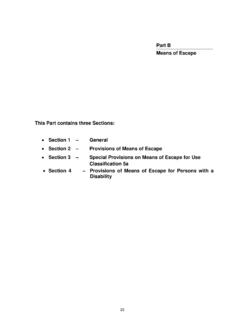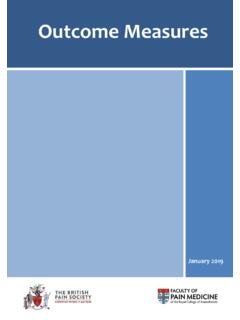Transcription of The Impact of Social Media Influencers on Purchase ...
1 Asian Journal of Business Research, Volume 7, Issue 2, 2017 19 Asian Journal of Business Research Volume 7, Issue 2, 2017 ISSN 2463-4522 e-ISSN 1778-8933 DOI: The Impact of Social Media Influencers on Purchase Intention and the Mediation Effect of Customer Attitude Xin Jean Lim Faculty of Economics and Management, Universiti Putra Malaysia Kuala Lumpur, Malaysia Aifa Rozaini bt Mohd Radzol Faculty of Economics and Management, Universiti Putra Malaysia Kuala Lumpur, Malaysia Jun-Hwa Cheah (Jacky) Azman Hashim International Business School, Universiti Teknologi Malaysia Kuala Lumpur, Malaysia Mun Wai Wong Faculty of Health, Arts and Design, Swinburne University of Technology Melbourne, Australia Abstract Social Media Influencers are first explored in the advertising field, particularly to create buzz in the younger markets and further expand Social Media coverage in businesses.
2 This study is designed to investigate the effectiveness of Social Media Influencers , focusing on source credibility, source attractiveness, product match-up, and meaning transfer. Consumer attitude is proposed to mediate between both the exogenous and endogenous relationships. Data collection was designed using the purposive sampling method and the dataset of 200 respondents was then analysed using PLS-SEM technique. All hypotheses are found to be supported except for source credibility. Mediating effects of consumer attitude are also determined. Implications, limitations, and suggestion for recommended research are further discussed. Keywords: Influencer Marketing, Social Media Influencers , Source Credibility, Source Attractiveness, Product Match-up, Meaning Transfer, Purchase Intention, PLS-SEM Lim, Radzol, Cheah and Wong, 2017 Asian Journal of Business Research, Volume 7, Issue 2, 2017 20 Background Influencer marketing emphasises the use of Influencers to drive a brand s message to reach the target segment (Smart Insights 2017).
3 In the age of ubiquitous Internet, Social Media Influencers have emerged as a dynamic third party endorser (Freberg et al. 2011). Leveraging on a plethora of Social Media platforms such as Facebook, Instagram, Twitter and Youtube, Social Media Influencers are aptly used to publicise product information and latest promotions to online followers (Markethub 2016). Social Media Influencers typically engage with their followers by regularly updating them with the latest information (Liu et al. 2012). In marketing, endorsement plays a significant role in achieving a company's good reputation and business goals. In recent years, Social Media Influencers have established themselves as potential endorsers by generating a range of buzzwords as compared to other marketing strategies ( , celebrity endorsement), and are deemed to be the most cost-efficient and -effective marketing trends (Harrison 2017; Patel 2016; Talaverna 2015).
4 Additionally, Social Media Influencers can also showcase compelling outcome in both Media coverage and consumer persuasion (Booth and Matic 2011). Nevertheless, research on Social Media Influencers is still relatively scant (Godey et al. 2016). Based on the tenets of influencer marketing, companies generally invite Social Media Influencers such as bloggers with thousands of followers in their Social Media accounts as their brand ambassador (Tapinfluence 2017). Messages proclaimed by Social Media Influencers are often perceived as more reliable and compelling to consumers, and have been substantiated by 82% of followers' polls, in which consumers are reported to be more likely to follow their favorite influences' recommendations (Talaverna 2015).
5 Compared to celebrity endorsement promotion strategy, the use of Social Media Influencers are regarded as more credible, trustworthy and knowledgeable due to their amiability in building rapport with consumers (Berger et al. 2016), especially for businesses that target the younger generations. According to a Neilsen marketing survey, influencer marketing yields returns on investments (ROI) 11 times higher as compared to digital marketing (Tapinfluence 2017). In contrast, celebrity endorsement are more instrumental in raising brand awareness among consumers, whilst Social Media Influencers play a highly significant role in driving product engagement and brand loyalty (Tapinfluece 2017) as they are more capable of communicating to a niche segment.
6 Organisations believe that endorsement can warrant the factuality of product information (Amoateng and Poku 2013; Sassenberg et al. 2012). Echoing this popular believe, Social Media Influencers as a brand endorser has grown more sought-after especially among new and small online businesses. Media Kix marketing reported that approximately 80% of online marketers claimed that Social Media Influencers are potential endorsers who boost their online businesses to higher levels (Forbes 2017). These statistical evidences can validate the effectiveness of Social Media Influencers in stimulating consumers' Purchase intention. Recent influencer marketing reports also demonstrated an estimated 50% of the brands earmarked an uptick fund allocation in hiring Social Media Influencers to promote their brands (Forbes 2017).
7 Moreover, Social Media Lim, Radzol, Cheah and Wong, 2017 Asian Journal of Business Research, Volume 7, Issue 2, 2017 21 Influencers are perceived as more sincere in delivering and demonstrating the endorsed product to their followers (Tapinfluece 2017). This research further seeks to understand the notion of Social Media Influencers by examining the effect on consumers' attitude and Purchase intention. Morwitz (2014) interprets Purchase intention as a widely-used marketing tool to estimate the effectiveness of a marketing strategy, which can be used to predict sales and market share. This study provides a comprehensive understanding towards measuring Social Media Influencers ' effectiveness by using four constructs which are: source credibility (Hovland and Weiss 1951), source attractiveness (McGuire 1985), product match-up (Till and Busler 1998), and meaning transfer (McCracken 1989).
8 Therefore, identifying the effectiveness of Social Media Influencers ( , source credibility, source attractiveness, product match-up, and meaning transfer) on Purchase intention through customers' attitude could potentially offer valuable insights to marketing practitioners, whereby they can develop promotional strategies to shape positive and impactful customers' decision-making towards their product and services. Underpinning Theory Social learning theory by Bandura (1963) has been widely applied in academic research, particularly in communication and advertising fields (Bush et al. 2004). It acts as a theoretical framework to provide ideas of socialization agents that can predict consumption behaviours (King and Multon 1996; Martin and Bush 2000).
9 Social learning theory justifies that an individual derives motivation and consequently exhibits favourable attitude from socialisation agents via either direct or indirect Social interaction (Subramanian and Subramanian 1995; Moschis and Churchill 1978). Previous marketing studies have adopted this theory to understand consumer consumption behaviour through various socialisation agents such as celebrities, family, or peers (North and Kotze 2001; Clark et al. 2001; Martin and Bush 2000). For instance, Makgosa (2010) revealed that Social learning theory can convincingly explain the Impact of celebrities on consumption behaviours. Aligned with Makgosa's assertion, Social learning theory is proposed as a contextual foundation in understanding Social Media Influencers as they represent a novel type of independent third-party endorser ( , the concept is somehow similar to celebrity endorsement), who can shape audience attitudes and decision-making through the use of Social Media .
10 Thus, Social learning theory posits that an individual s intention to Purchase products is highly influenced by the respondents' attitude and effectiveness of Social Media Influencers ( , source credibility, source attractiveness, product match-up and meaning transfer) in promoting the products (see Figure 1). Hypotheses Development Source Credibility Source credibility is widely used to analyse the effectiveness of endorsement (Hovland and Weiss 1951; Taghipoorreyneh and de Run 2016). Specifically, a credible endorser generally exhibits positive effect towards consumers perception ( goldsmith et al. 2000). Trustworthiness and expertise are two elements that are discussed within source credibility. Information presented by a credible source ( Lim, Radzol, Cheah and Wong, 2017 Asian Journal of Business Research, Volume 7, Issue 2, 2017 22 Social Media Influencers ) can affect consumers beliefs, opinions, attitudes and behaviours (Wang et al.)








